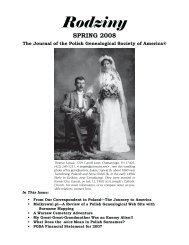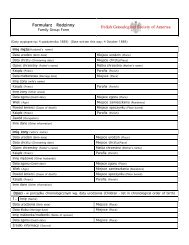A Crash Course in Polish: Words You Can Use
A Crash Course in Polish: Words You Can Use
A Crash Course in Polish: Words You Can Use
You also want an ePaper? Increase the reach of your titles
YUMPU automatically turns print PDFs into web optimized ePapers that Google loves.
CEMETERY INSCRIPTIONS<br />
The f<strong>in</strong>al memorials of our ancestors, their cemetery monuments, were often carved <strong>in</strong> their<br />
native language. This is especially true if they died a short while after com<strong>in</strong>g to the U. S., for<br />
the ties to the old country and its language were stronger.<br />
The limited vocabulary found on stones can be quickly mastered, but the researcher should<br />
be aware of certa<strong>in</strong> factors which will help make sense of mystify<strong>in</strong>g or <strong>in</strong>consistent items on the<br />
stones. We should remember that <strong>in</strong> the very early days of many <strong>Polish</strong> settlements, a merchant<br />
and professional class was yet to emerge; thus there were few stone-cutters who spoke or understood<br />
<strong>Polish</strong>. The Yankee stone-carver <strong>in</strong> a small Massachusetts or Connecticut town was puzzled<br />
by the ł or ę of the <strong>Polish</strong> alphabet, and this could lead to mistakes, e. g., mistak<strong>in</strong>g ł for t,<br />
etc. Thus we will f<strong>in</strong>d items such as żyta and urodzita się on stones <strong>in</strong>stead of the correct żyła and<br />
urodziła się. At other times it seems that the data to be carved on the stones was conveyed orally,<br />
and the results reflect this fact — badly misspelled words <strong>in</strong> a quasi-Anglicized phonetic<br />
rendition.<br />
The material that follows should enable you to make your next <strong>in</strong>formation-gather<strong>in</strong>g trip to<br />
a cemetery more profitable l<strong>in</strong>guistically.<br />
Introductory Phrases<br />
If they appear at all, the follow<strong>in</strong>g phrases may beg<strong>in</strong> an epitaph; but <strong>in</strong> many cases only the<br />
names are recorded, without any prelim<strong>in</strong>aries.<br />
Ku pamięci — “To the memory of.” S<strong>in</strong>ce “the memory of” expresses a relationship normally<br />
rendered <strong>in</strong> <strong>Polish</strong> with the genitive case, one should expect case end<strong>in</strong>gs on names that follow:<br />
Ku pamięci Józefa Jaworskiego, “To the memory of Józef Jaworski.” More common,<br />
actually, is the simple expression świętej pamięci, “of sacred memory,” commonly abbreviated<br />
ś. p. Names follow<strong>in</strong>g ś. p. are generally <strong>in</strong> the nom<strong>in</strong>ative case.<br />
Tu spoczywa/spoczywają — “Here lies/lie...,” from spoczywać, “to rest.” This phrase, often abbreviated<br />
Tu sp., is followed by the name(s) of the deceased, or may conta<strong>in</strong> additional expressions,<br />
e. g.: Tu spoczywają zwłoki, “here lies the body [of]”; Tu spoczywają śmiertelne<br />
szczątki, “Here lie the mortal rema<strong>in</strong>s [of]”; Tu spoczywają prochy, “Here lie the ashes [of].”<br />
The last three expressions naturally tend to end with “of,” so the names follow<strong>in</strong>g them will<br />
be <strong>in</strong> the genitive case: Tu spoczywają prochy Józefa Jaworskiego i jego żony Katarzyny,<br />
“Here lie the ashes of Józef Jaworski and his wife Katarzyna.”<br />
Za dusze: “for the souls of.” The word dusze is accusative plural of dusza, “spirit, soul” after the<br />
preposition za, which can mean, among other th<strong>in</strong>gs, “for, on behalf of.”<br />
Phrases Referr<strong>in</strong>g to Death<br />
By far the most common word here is simply zmarł (referr<strong>in</strong>g to a male) or zmarła (referr<strong>in</strong>g<br />
to a female), abbreviated zm., mean<strong>in</strong>g “he/she died.” We also see umarł/umarła, abbreviated<br />
um. For some, however, those expressions may have seemed a bit too blunt, and thus euphemisms<br />
were used. They <strong>in</strong>clude:<br />
Polecał/polecała ducha Bogu: “commended his/her soul to God.” The term ducha is from duch,<br />
“spirit” or “soul” (not the same word as dusza, which we saw above, but from the same l<strong>in</strong>guistic<br />
root). Bogu is the dative s<strong>in</strong>gular of Bóg, “God.”<br />
Hoffman – A <strong>Crash</strong> <strong>Course</strong> <strong>in</strong> <strong>Polish</strong>: <strong>Words</strong> <strong>You</strong> <strong>Can</strong> <strong>Use</strong> – 12







